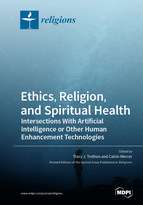Ethics, Religion, and Spiritual Health: Intersections With Artificial Intelligence or Other Human Enhancement Technologies
A special issue of Religions (ISSN 2077-1444).
Deadline for manuscript submissions: closed (22 March 2022) | Viewed by 31985
Special Issue Editors
Interests: biomedical and social ethics; spiritual and religious health; aging; human enhancement technologies; sport
Special Issues, Collections and Topics in MDPI journals
Interests: human enhancement technology; superintelligence; whole brain emulation (mind-uploading)
Special Issues, Collections and Topics in MDPI journals
Special Issue Information
Dear Colleagues,
There is a paucity of published research addressing spiritual and religious health, ethics, and AI and other human enhancement technologies (HETs). However, in recent years, there has begun to emerge a robust body of publications addressing human enhancement ethics, including the use of narrow Artificial Intelligence to make us “better.” The study of religion and theology have become notable realms for thought experiments concerning the possibility of general AI and superintelligence. Concern for spiritual health promises to make the study of religion and human enhancement ethics more pressing in the public square.
Articles will consider the possible and probable impacts of AI, in relation to religion and ethics and/or spiritual health. All articles will address religion and/or spirituality in some way. You may choose to consider one particular religion or a more general but articulated understanding of religion or spiritual health.
All articles will also address ethics and/or spiritual health. Spiritual health may also be understood as spiritual wellbeing. For those of you writing on spiritual health and AI, you may choose particular aspects of spiritual health theory/approaches. If you have expertise in psychotherapy or another form of spiritual health, we encourage articles that explore the connection between psychotherapy, spiritual health, and the dramatic increases in AI, such as the use of health infomatics, remote healthcare via the internet, diagnostic algorithms, robots for patient comfort, and radical HETs. Your paper can contribute in some way to forwarding the conversation about the intersection of religious ethics and/or spiritual health and AI/HET.
Prof. Dr. Tracy J. Trothen
Prof. Dr. Calvin Mercer
Guest Editors
Manuscript Submission Information
Manuscripts should be submitted online at www.mdpi.com by registering and logging in to this website. Once you are registered, click here to go to the submission form. Manuscripts can be submitted until the deadline. All submissions that pass pre-check are peer-reviewed. Accepted papers will be published continuously in the journal (as soon as accepted) and will be listed together on the special issue website. Research articles, review articles as well as short communications are invited. For planned papers, a title and short abstract (about 100 words) can be sent to the Editorial Office for announcement on this website.
Submitted manuscripts should not have been published previously, nor be under consideration for publication elsewhere (except conference proceedings papers). All manuscripts are thoroughly refereed through a double-blind peer-review process. A guide for authors and other relevant information for submission of manuscripts is available on the Instructions for Authors page. Religions is an international peer-reviewed open access monthly journal published by MDPI.
Please visit the Instructions for Authors page before submitting a manuscript. The Article Processing Charge (APC) for publication in this open access journal is 1800 CHF (Swiss Francs). Submitted papers should be well formatted and use good English. Authors may use MDPI's English editing service prior to publication or during author revisions.
Keywords
- artificial intelligence
- ethics
- spiritual and religious health
- biohacking
- enhancement







